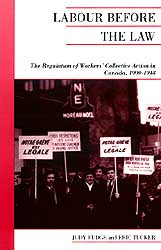by Judy Fudge, Landsdowne Professor of Law, University of Victoria and Eric Tucker, Professor, Osgoode Hall Law School, York University. Published with Oxford University Press, 2001.
There is now a large volume of literature on Canadian labour history. In this literature, there has been no lack of attention paid to numerous issues involving the legal rights of unions and employers, but often there has been a lack of clarity in the discussion of labour-law issues. This book, based both on a careful sifting of the secondary literature and on painstaking archival research, effectively and authoritatively addresses this situation. The authors demonstrate that the period under discussion saw a critical transition from a legal regime characterized by the predominance of the values of legal individualism and freedom of contract to an era of industrial pluralism. This important book demonstrates why and how the new regime was put in place and assesses the degree to which it simultaneously embodied a marked departure from what preceded it and a revitalized commitment to market ordering and voluntarism. Professors Fudge and Tucker have given us what probably will remain the definitive legal study of an innovative and critical phase in industrial relations in Canada.



